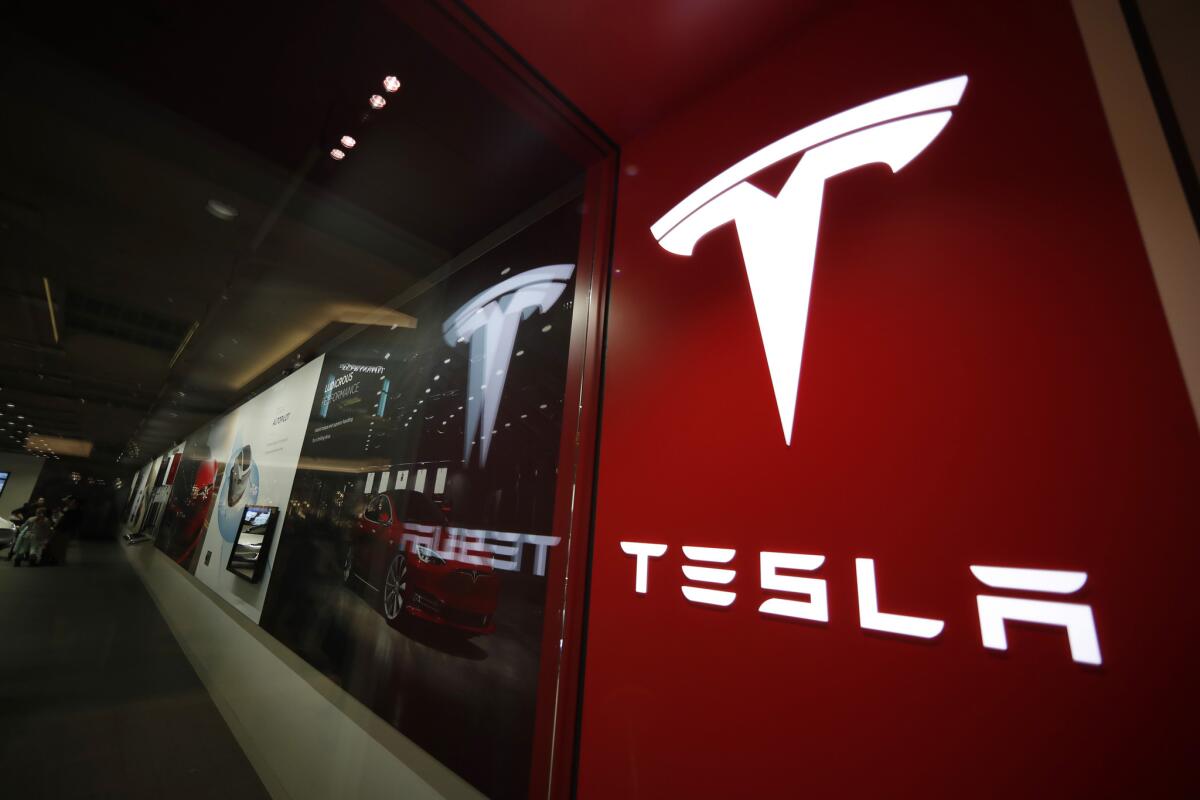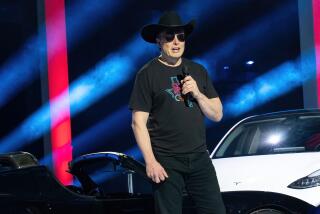Elon Musk plans $2-billion stock offering as Tesla acknowledges SEC probe

- Share via
Tesla Inc. is selling more than $2 billion of common stock, taking advantage of its surging shares just two weeks after Chief Executive Elon Musk said raising capital didn’t make sense.
Assuming underwriters exercise their option to purchase additional securities, the offering could bring in about $2.3 billion, the electric-vehicle maker said in a statement Thursday. That will help fund as much as $3.5 billion in capital expenditures this year, a plan the company disclosed less than an hour earlier in a regulatory filing.
The company also announced several government probes in a 10-K filing Thursday. It said a subpoena has been issued by the Securities and Exchange Commission “concerning certain financial data and contracts,” and that Bay Area air regulators and the U.S. Environmental Protection Agency are investigating whether clean-air laws have been violated at its Fremont, Calif., assembly plant.
Tesla shares finished Thursday up 4.8%, at $804. The stock price had more than tripled since the company released the first of two straight positive earnings reports in October.
The offering is a sudden turnabout by Musk, who told analysts two weeks ago that Tesla could fund itself without Wall Street’s help. The company had been spending sensibly and not holding back on expenditures in ways that would limit progress, he said.
“So in light of that, it doesn’t make sense to raise money because we expect to generate cash despite this growth level,” Musk said Jan. 29. Tesla will use proceeds from the offering to strengthen its balance sheet and for general corporate purposes.
The expected trading date for the shares is said to be Friday.
The offering is prudent given where the shares are trading, “albeit somewhat contrary to management’s recent commentary,” Ben Kallo, an analyst at Robert W. Baird, wrote in a report. Some investors will argue the company should be raising more, he said.
The high end of Tesla’s 2020 expenditures projection, disclosed for the first time in its so-called 10-K filing, represents a 164% increase from 2019, when stingy spending helped conserve cash. Last year’s $1.33 billion in expenditures were well below its initial plan for as much as $2.5 billion.
SEC subpoena
In the filing, Tesla disclosed that the U.S. Securities and Exchange Commission closed its investigations into statements Musk made in 2018 about taking the company private, as well as his prior predictions about Model 3 production rates.
But on Dec. 4, the same day it closed those investigations, the SEC also issued Tesla a subpoena seeking information “concerning certain financial data and contracts,” including regular financing arrangements, the company said.
The Tesla 10-K also reported that “notices of violation” concerning air permits at the Fremont plant were issued to the company by the Bay Area Air Quality Management District — though Tesla noted the district “has not initiated formal proceedings.” The EPA, according to the 10-K, sent the company an “information request” concerning the Fremont plant. The matter “is not currently expected to have a material adverse impact on our business,” the filing stated.
The filing doesn’t provide detail on the clean-air probes. The website the Drive has written extensively about them, reporting that the issues center on the factory’s paint shop.
Tesla doesn’t report sales by region or breakdown of revenue by country in its earnings report, but does so in its later regulatory filings. On Thursday, the company said revenue rose 70% in China, 65% in the Netherlands and 48% in Norway last year. But in the U.S. — by far its largest market — revenue fell 15%, to $12.65 billion.
Tesla had 48,016 full-time employees at the end of 2019, down slightly from 48,817 from a year earlier.
The maker of the Model 3 and S sedans and the Model X crossover is projecting at least 500,000 vehicle deliveries this year, a more than 35% jump from 2019. Musk has accelerated the rollout of Tesla’s next vehicle, the Model Y crossover, to this quarter from initial plans for the fall.
The filing also showed that Musk has $548 million in personal loans from Morgan Stanley, Goldman Sachs Group Inc. and Bank of America Corp., an increase of about 8% since Tesla’s previous disclosure in May.
The recent rise in Tesla shares has helped boost Musk’s net worth by about 50% this year to $40.5 billion, according to the Bloomberg Billionaires Index. Still, he told a judge as recently as December that he’s short on cash. His holdings in Tesla and Space Exploration Technologies Corp. comprise most of his wealth, and he hasn’t sold any of his Tesla stock for years.
Instead, he has tapped banks for loans, using his stake as collateral. Pledging shares is a way to monetize equity without actually selling it. Most publicly traded companies prohibit the practice out of concern that it can affect an executive’s decision-making.
Tesla provides “flexibility in financial planning without having to rely on large cash compensation or the sale of company shares,” the board said in its proxy filing last year.
Los Angeles Times reporter Russ Mitchell contributed to this story.






